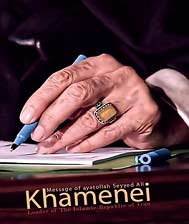Hometown of Executed Saudi Cleric in Turmoil

TEHRAN (FNA)- People in Saudi Arabia's Eastern province poured into the streets of Qatif city on Saturday in reaction to the execution of prominent Muslim cleric Nimr al-Nimr as hundreds of Saudi security forces were sent to the region to suppress any possible uprising.
Calls for people's protest rally in Qatif city, the hometown of Sheikh Nimr, surged in social media pages after Riyadh announced execution of globally renowned Shiite leader.
Al-Qatif Mobasher Twitter page that covers developments in Qatif and is widely shared in Eastern Saudi Arabia issued a public call for popular uprising in the Eastern city after the execution of the Shiite cleric.
The Riyadh government has dispatched large numbers of armored vehicles to Qatif to suppress the angry people protesting the execution of Sheikh Nimr.
The Saudi regime is afraid of widespread popular uprising, specially in the Shiite regions in Eastern Saudi Arabia after it executed Sheikh Nimr, and it has dispatched hundreds of armored vehicles to the province, the Arabic-language al-Ahd news website reported.
Saudi Arabia announced Saturday that it has executed the prominent Shiite Muslim cleric.
Saudi Arabia executed 47 people on Saturday for terrorism, including Sheikh Nimr, the country's Interior Ministry said in a statement. Most of those executed were said to be involved in a series of attacks carried out by Al-Qaeda between 2003 and 2006. 45 of those executed were of Saudi nationality, one Chadian, one Egyptian.
The Interior Ministry statement announcing the executions began with verses from the Quran, justifying the use of the death penalty, while state television showed footage of the aftermath of Al-Qaeda attacks over the last decade. Shortly afterward, Saudi Grand Mufti Sheikh Abdulaziz Al al-Sheikh appeared on Saudi Arabian television, hailing the executions as just.
Al-Qaeda is the number one enemy of Shiite Muslims, and the Saudi television did not explain how it could link the footage to the execution of a Shiite leader who has been the target of ISIL and Al-Qaeda.
Iranian high-ranking officials had regularly deplored Riyadh for handing down death sentence to prominent Shiite cleric, warning that execution of the Sheikh Nimr would incur a heavy price in Saudi Arabia, and would set the stage for the fall of the Saudi regime.
Several rights activists had also warned Riyadh that execution of Sheikh Nimr would set fire to Saudi Arabia.
Heretofore, Al Saud had frequently said that it plans to execute Sheikh soon, but the kingdom delayed it every time. According to an informed source, the new King and his hawkish cabinet members mean to send a message to the Shiite community, dissidents and Iran through the move to show they are ready to pay any price in confrontation with Tehran. Though Iran has repeatedly denied any link with the Shiite dissidents in Saudi Arabia.
During the recent months, people across the world staged protest in support of Sheikh Nimr, calling for immediate release of the leader, warning the Wahhabi authorities against executing prominent Shiite cleric.
Nimr was attacked and arrested in the Qatif region of Eastern Province in July 2012, and has been charged with undermining the kingdom’s security, making anti-government speeches, and defending political prisoners. Nimr has denied the accusations.
In October 2014, a Saudi court sentenced Sheikh Nimr to death, provoking huge condemnations and criticism in the Middle East and the world.
On October 25, Nimr’s family confirmed that the Saudi Supreme Court and the Specialized Appeals Court had endorsed a death sentence issued last year against him for inciting sectarian strife and disobeying King Salman bin Abdulaziz Al Saud. The cleric has denied the charges.
The Shiite cleric’s lawyer, Sadeq al-Jubran, had also said that Nimr could be executed as soon as the Saudi monarch approves his sentence.
Human rights organizations have condemned Saudi Arabia for failing to address the rights situation in the kingdom. They say Saudi Arabia has persistently implemented repressive policies that stifle freedom of expression, association and assembly.
Ashura
- The Third Imam, Husayn Ibn ‘Ali (as)
- A brief look at the Life of Imam Hussein
- Karbala – the Rendezvous of Faith
- In the School of Imam Husain (AS) – 2
- In the school of Imam Husain (AS) - 1
- Ziarat-e-Ashura
- The Imam Husayn's Concepts of Religion and Leadership
- Karbala and the Imam Husayn in Persian And Indo-Muslim literature
- Hazrat Zainab's(s.a) Marriage
- Hazrat Zainab (s.a.) and Imamate
- Hazrat Zainab (s.a.) in Karbala
- Who was Yazid?
- SHIMR B. ZIL JAWSHAN
- The Imam’s Brother, ‘Abbās's Martyrdom
- The Martyrdom of Abalfazl-Abbas(A)
- The short life History of Hadhrat Abbas (as)
- Titles of Hazrat Abbas (a.s.)
- The Imam’s Brother, ‘Abbās's Martyrdom
- A short biography of Hazrat Ummul-Baneen (s.a)
- The Standard Bearer of Husain
Articles
- The Actions of God
- Methods of Tabligh (propagation)
- The Signs of the Appearance (Zuhur) of the Mahdi
- Further Investigation in the Hadith-Reports
- How Will the Imam Know That the Time for the Appearance (Zuhur) Has Come?
- The Minds of the People Prepare for the Advent of the Mahdi
- The Residence of the Twelfth Imam
- The Research about Longevity
- The Sunni Books on the Characteristics of the Mahdi
- Why Did Not the Occultation Become Complete from the Beginning?
- Can a Five Year Old Boy Become an Imam?
- Who Was the Imam after Hasan Al-'Askari?
- The Unseen World and the Imam of the Age
- Mahdiism, the Jews, and the Iranians
- The Pseudo-Mahdis
- The Beginning of the Belief in the Mahdi
- Love, Sexual Discipline and Chastity. Democratic Morality, Love in Personality Growth
- Basic Need for Humane Conditioning of Natural Instincts And Desires
- A Critical Examination of The Theoretical Basis of The Proposed New Sexual Freedom
- Proposed New Sexual Freedom
Shiite Studies
- Who is a Real Shia Muslim?
- SHI'ITE RELIGIOUS THOUGHT
- Heavenly Warrant
- What does “Shi‘ah” mean?
- Why do the Shī‘ah prostrate on turbah (dried clay)?
- Is according to Islam religion separate from politics?
- What are the sources of Shī‘ī jurisprudence (fiqh)?
- Shia’ jurisprudence
- The features of Shia' ethics
- 22 Not a new lifestyle
Wahabiyat

I am a film writer writing a film presently with the aim of promoting Islamic unity and solidarity
the most visited materials
- Who Is Almighty Allah? (247750)
- Who is a Real Shia Muslim? (233700)
- Islam and Its Social System (230558)
- Brief History of Religions (229690)
- How I find that Islam does not Oppress Women? (229680)
- Islam Attacks Slavery 1 (228885)
- The Clearest Reason for Free Will (227910)
- The Advantages of Religion 1 (227361)
- Attributes of The Real Follower of Imams in Their Teachings (224186)
- Fundamental principles of Islam (223392)
- RIGHTS OF SCHOLARS (222680)
- The Rights Islam Offers to Women (222141)
- What are the differences between Shia and Sunni Muslims؟ (221089)
- Islam Various Systems (220231)
Islam Studies
- Fundamental principles of Islam (223392)
- RIGHTS OF SCHOLARS (222680)
- Islam Various Systems (220231)
- Some Hadithes on the Faith of AbuTalib (124612)
- Islam and the Genuine Needs of Every Epoch (115012)
- Islam and Racism (112373)
- Why did God locate Kaaba in a barren desert? (105732)
- Islam and Traditional Sexual Ethics (103258)
- Does Islam permit Contraception? (102968)
- Importance of Marriage in Islam (101732)
- How to ponder on the Philosophy of Islamic Laws? (93165)
- Is there any consensus on prohibition of constructing mausoleum? (92071)
Judaism،Christianity
- I attended Muslim prayers several years ago when the speaker was talking about Jesus and Islam. (69633)
- I have been fortunate in the sense that I had a Muslim father and a Christian Mother. (69341)
- Sir I was looking for some precise proof of our belief that the Bible available in the current time is corrupt, through protestant beliefs and the proofs being scientific as well. (61066)
- What does Islam say about Prophet Isa (pbuh) walking on water? (57768)
- Is it a sin reading the Bible? (57314)
- Do Christians acknowledge the Prophethood of Khidhr and recognize him officially? (57056)
- Is it true that Lady Maryam would receive food and fruit from heaven? (56318)
- In verse 55 of Aal-i Imran, God states that: (55364)
- What do Jews say about the return of Prophet Isa (pbuh) or the coming of the Promised Messiah? (54443)
























